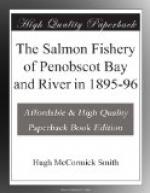“In my opinion, there would not enough salmon come into the river to pay for building weirs if there had been no salmon artificially hatched; and I hope the Government will continue to keep the salmon fishing up, so it will pay to build our weirs. No person that knows anything about it can doubt that it is a good thing for the fishermen.”
Mr. Harvey Heath, of Verona, has two weirs on the eastern side of the southern end of Whitmore Island. He caught 62 salmon in 1895, and 100 in 1896. He thinks that the removal of obstructions to the passage of fish to their spawning-grounds would be all that is necessary to secure a good run of fish in the river, but believes that under present conditions the salmon-cultural work of the Government is very useful in sustaining the fishery.
Three weirs of Mr. E. A. Bowden, located on the eastern side of Whitmore Island, above those of Mr. Heath, took, 31 salmon in 1895, and 85 in 1896. Mr. Bowden says:
“I think that if it was not for the hatchery we would not have any salmon to speak of, for all the school we have is in June. April, May, and July salmon are very scarce.”
Mr. Charles G. Atkins, superintendent of the government salmon hatchery in Orland, Me., informs the writer that he has been inclined to believe that each year a great many salmon succeed in reaching their spawning grounds; but recent observations have caused him to change his mind, and he is now of the opinion that only relatively few salmon elude the traps, weirs, and gill nets, surmount the dams and fishways, escape the poachers, and succeed in depositing their eggs under conditions favorable to their development. The dam at Bangor, while certainly a formidable obstruction to the passage of fish, is probably passable at high water. It is provided with a fishway, and some fish are known to surmount the dam by this means. Above Bangor, in the main river, there are dams at Great Works and Montague, the dam at Montague being an especially serious obstruction, although it is provided with a good fishway. Below the dam at Bangor there is little poaching, but below the other dams—especially at Montague—comparatively large numbers of salmon are sacrificed by the illegal use of the spear and drift net. In 1896 all the salmon below Montague were at the mercy of poachers after July 15, when all wardens on the river were laid off. The supply of spawning fish was thus greatly reduced. The people above Bangor have no interest in preserving the salmon supply of the river, as they receive none of the benefits from fishing which are enjoyed by fishermen of the lower river.
This year Mr. Atkins, having this matter under consideration, visited the east branch of the Penobscot River. A certain tributary of the east branch, which was said to be one of the best spawning-grounds for salmon in the Penobscot basin, was obstructed by a dam in the spawning region. The dam was impassable to fish in July, and had been so during the previous months. In a deep pool below the dam, which was reported to be a favorite resort for salmon each season, no salmon were found. In other words, if the salmon had reached this stream they could not have gotten above the dam, and would undoubtedly have congregated in the pool mentioned and been noticed, but no fish had ascended even that far.




